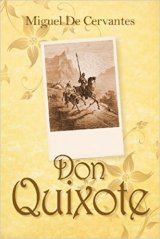Don Quixote Page #9
The Ingenious Nobleman Sir Quixote of La Mancha, or just Don Quixote, is a Spanish novel by Miguel de Cervantes.
The niece said the same, and, more: "You must know, Master Nicholas"--for that was the name of the barber--"it was often my uncle's way to stay two days and nights together poring over these unholy books of misventures, after which he would fling the book away and snatch up his sword and fall to slashing the walls; and when he was tired out he would say he had killed four giants like four towers; and the sweat that flowed from him when he was weary he said was the blood of the wounds he had received in battle; and then he would drink a great jug of cold water and become calm and quiet, saying that this water was a most precious potion which the sage Esquife, a great magician and friend of his, had brought him. But I take all the blame upon myself for never having told your worships of my uncle's vagaries, that you might put a stop to them before things had come to this pass, and burn all these accursed books--for he has a great number--that richly deserve to be burned like heretics." "So say I too," said the curate, "and by my faith to-morrow shall not pass without public judgment upon them, and may they be condemned to the flames lest they lead those that read to behave as my good friend seems to have behaved." All this the peasant heard, and from it he understood at last what was the matter with his neighbour, so he began calling aloud, "Open, your worships, to Senor Baldwin and to Senor the Marquis of Mantua, who comes badly wounded, and to Senor Abindarraez, the Moor, whom the valiant Rodrigo de Narvaez, the Alcaide of Antequera, brings captive." At these words they all hurried out, and when they recognised their friend, master, and uncle, who had not yet dismounted from the ass because he could not, they ran to embrace him. "Hold!" said he, "for I am badly wounded through my horse's fault; carry me to bed, and if possible send for the wise Urganda to cure and see to my wounds." "See there! plague on it!" cried the housekeeper at this: "did not my heart tell the truth as to which foot my master went lame of? To bed with your worship at once, and we will contrive to cure you here without fetching that Hurgada. A curse I say once more, and a hundred times more, on those books of chivalry that have brought your worship to such a pass." They carried him to bed at once, and after searching for his wounds could find none, but he said they were all bruises from having had a severe fall with his horse Rocinante when in combat with ten giants, the biggest and the boldest to be found on earth. "So, so!" said the curate, "are there giants in the dance? By the sign of the Cross I will burn them to-morrow before the day over." They put a host of questions to Don Quixote, but his only answer to all was--give him something to eat, and leave him to sleep, for that was what he needed most. They did so, and the curate questioned the peasant at great length as to how he had found Don Quixote. He told him, and the nonsense he had talked when found and on the way home, all which made the licentiate the more eager to do what he did the next day, which was to summon his friend the barber, Master Nicholas, and go with him to Don Quixote's house. CHAPTER VI. OF THE DIVERTING AND IMPORTANT SCRUTINY WHICH THE CURATE AND THE BARBER MADE IN THE LIBRARY OF OUR INGENIOUS GENTLEMAN He was still sleeping; so the curate asked the niece for the keys of the room where the books, the authors of all the mischief, were, and right willingly she gave them. They all went in, the housekeeper with them, and found more than a hundred volumes of big books very well bound, and some other small ones. The moment the housekeeper saw them she turned about and ran out of the room, and came back immediately with a saucer of holy water and a sprinkler, saying, "Here, your worship, senor licentiate, sprinkle this room; don't leave any magician of the many there are in these books to bewitch us in revenge for our design of banishing them from the world." The simplicity of the housekeeper made the licentiate laugh, and he directed the barber to give him the books one by one to see what they were about, as there might be some to be found among them that did not deserve the penalty of fire. "No," said the niece, "there is no reason for showing mercy to any of them; they have every one of them done mischief; better fling them out of the window into the court and make a pile of them and set fire to them; or else carry them into the yard, and there a bonfire can be made without the smoke giving any annoyance." The housekeeper said the same, so eager were they both for the slaughter of those innocents, but the curate would not agree to it without first reading at any rate the titles. The first that Master Nicholas put into his hand was "The four books of Amadis of Gaul." "This seems a mysterious thing," said the curate, "for, as I have heard say, this was the first book of chivalry printed in Spain, and from this all the others derive their birth and origin; so it seems to me that we ought inexorably to condemn it to the flames as the founder of so vile a sect." "Nay, sir," said the barber, "I too, have heard say that this is the best of all the books of this kind that have been written, and so, as something singular in its line, it ought to be pardoned." "True," said the curate; "and for that reason let its life be spared for the present. Let us see that other which is next to it." "It is," said the barber, "the 'Sergas de Esplandian,' the lawful son of Amadis of Gaul." "Then verily," said the curate, "the merit of the father must not be put down to the account of the son. Take it, mistress housekeeper; open the window and fling it into the yard and lay the foundation of the pile for the bonfire we are to make." The housekeeper obeyed with great satisfaction, and the worthy "Esplandian" went flying into the yard to await with all patience the fire that was in store for him.
Translation
Translate and read this book in other languages:
Select another language:
- - Select -
- 简体中文 (Chinese - Simplified)
- 繁體中文 (Chinese - Traditional)
- Español (Spanish)
- Esperanto (Esperanto)
- 日本語 (Japanese)
- Português (Portuguese)
- Deutsch (German)
- العربية (Arabic)
- Français (French)
- Русский (Russian)
- ಕನ್ನಡ (Kannada)
- 한국어 (Korean)
- עברית (Hebrew)
- Gaeilge (Irish)
- Українська (Ukrainian)
- اردو (Urdu)
- Magyar (Hungarian)
- मानक हिन्दी (Hindi)
- Indonesia (Indonesian)
- Italiano (Italian)
- தமிழ் (Tamil)
- Türkçe (Turkish)
- తెలుగు (Telugu)
- ภาษาไทย (Thai)
- Tiếng Việt (Vietnamese)
- Čeština (Czech)
- Polski (Polish)
- Bahasa Indonesia (Indonesian)
- Românește (Romanian)
- Nederlands (Dutch)
- Ελληνικά (Greek)
- Latinum (Latin)
- Svenska (Swedish)
- Dansk (Danish)
- Suomi (Finnish)
- فارسی (Persian)
- ייִדיש (Yiddish)
- հայերեն (Armenian)
- Norsk (Norwegian)
- English (English)
Citation
Use the citation below to add this book to your bibliography:
Style:MLAChicagoAPA
"Don Quixote Books." Literature.com. STANDS4 LLC, 2025. Web. 5 Feb. 2025. <https://www.literature.com/book/don_quixote_27>.








Discuss this Don Quixote book with the community:
Report Comment
We're doing our best to make sure our content is useful, accurate and safe.
If by any chance you spot an inappropriate comment while navigating through our website please use this form to let us know, and we'll take care of it shortly.
Attachment
You need to be logged in to favorite.
Log In